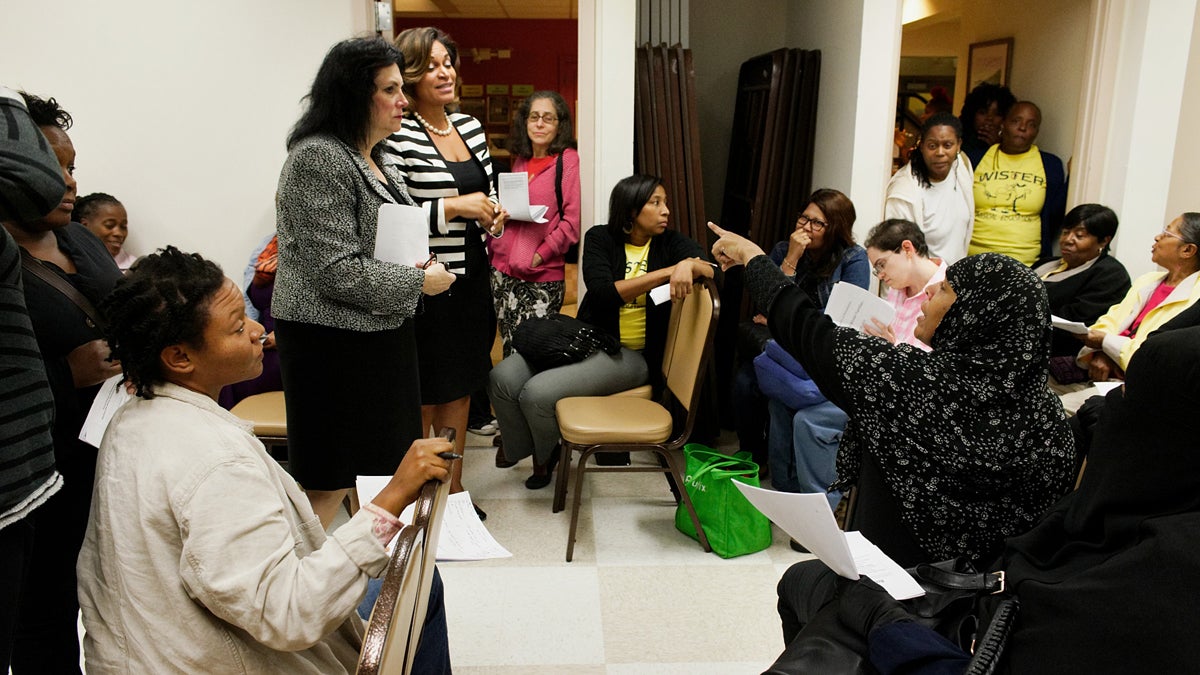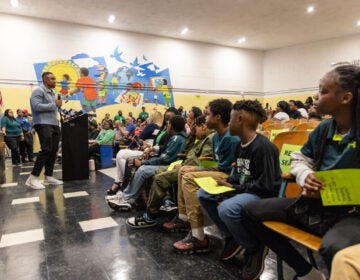Four charter organizations apply to convert three Philly elementary schools

Members of the Wister Elementary School community hear a pitch from district staffers on a proposed charter conversion at an October meeting in Germantown. (Bastiaan Slabbers/for NewsWorks)
Four charter management organizations have applied to take over operations at three district elementary schools and run them as neighborhood-based charters, the School District of Philadelphia announced Tuesday.
Superintendent William Hite proposed renaissance charter conversion for Cooke, Huey and Wister elementary schools on Oct 1.
Cooke
Responding to a request for qualifications to manage Cooke, located in Logan, the district received one letter of interest, from the Great Oaks Foundation.
Great Oaks – which runs four schools in Newark, New Jersey; New York City; Bridgeport, Connecticut; and Wilmington, Delaware – makes “high-dosage tutoring” a centerpiece of its model.
In addition to a full-time staff, Great Oaks says it would hire AmeriCorps volunteers to act as full-time tutors, providing them housing and a small stipend.
“We’re trying to offer something that will really benefit students,” said Rashaun Reid, chief academic officer for Great Oaks.
Reid, a graduate of Temple University, owns a home in Philadelphia. Until last year, he was principal of Mastery Cleveland; before that, he was assistant principal of Mastery Mann. Both are existing city renaissance schools.
Great Oaks president Michael Duffy, the former head of the charter office in New York City’s Department of Education, also served as the managing director of Victory Education Partners – a for-profit operator that ran six schools in Philadelphia starting in 2002.
In the 2000s, the district handed over 45 of its low-performing schools to outside, for-profit management companies.
Although those schools received more per-pupil funding, they failed to exceed the gains made in district-run schools. By 2011, the School Reform Commission had ended all of its contracts with outside managers, including Victory.
An independent charter overseen by Victory opened in 2007 in West Philadelphia, as Southwest Leadership Academy Charter.
Wister
The only letter of intent the district received for the proposed conversion of Wister Elementary in Germantown came from Mastery Charter Schools, which has headquarters in the same neighborhood.
Mastery is the only applicant with experience in converting schools that serve proscribed neighborhood boundaries – which is often thought to be much more difficult work than that involved in lottery-based charters.
Since 2010, the district has handed 20 of its schools to charter operators through the renaissance process. While some have seen gains on state tests, others have backslid.
Mastery has seen the greatest gains and has had the most success maintaining growth.
Mastery currently operates seven Philadelphia renaissance charters. By its count, Mastery runs 20 schools in Philadelphia in total, but some of those distinct schools represent different grade configurations within the same building.
Founder and CEO Scott Gordon said his team chose Wister based on its longstanding ties to the community.
Before the renaissance initiative, the district tapped Mastery to convert nearby Pickett Middle School in 2007, which has grown to a 6-12 school. In 2013, it assumed responsibility for Pastorius Elementary in East Germantown through the renaissance process. It also runs a 6-12 neighborhood-based charter at Simon-Gratz, in nearby Nicetown.
If approved by the SRC, students at Wister would naturally matriculate into Pickett.
Gordon said he understands why some parents would, at first, push back against the prospect of conversion.
“I think there’s a natural and understandable distrust, distrust of the process, distrust about Mastery or whomever would come in,” said Gordon. “There’s been a long history of broken promises to many of our neighborhood schools.”
But once Wister parents tour their buildings and meet existing Mastery parents, he believes they’ll see a major upside to the prospect.
“I feel confident that we can get there, because in our current renaissance schools – which had all been schools that were under-enrolled – enrollment collectively across them has grown by about 1,000 additional families,” he said. “That’s 1,000 families living in the neighborhood who previously didn’t go to the school that decided to come back.”
Huey
The district received two letters of interest to take over operations at West Philadelphia’s Huey Elementary.
One came from the leaders of West Philadelphia’s Global Leadership Academy, a K-8 lottery-based charter school serving 700 students.
Global Leadership CEO Naomi Booker, a graduate of Huey, said parents could look forward to smaller class sizes and a “non-negotiable” commitment to art and music.
Booker, who spent 34 years as an employee of the district, was the principal of Clymer Elementary in the 1990s before becoming a regional superintendent.
Booker came to Global Leadership Academy five years ago when it was known as Rising Horizons charter. She changed the name, instituted reforms — and test scores have risen.
“I know that I can turn that school around as well,” she said of Huey. “What’s important to me is to put as much money as possible toward the service of the children, not toward administration.”
Asked about the pushback to the proposal in the Huey community, Booker said, “I think people are frustrated. I think people really want what’s right for their children, and I just don’t think they know where to get it.”
The Minneapolis-based for-profit charter management organization SABIS also forwarded a bid. It operates 12 public charter schools serving 8,000 students in Massachusetts, New Jersey, Michigan, Ohio, Louisiana, and Arizona.
But Jose Afonso, SABIS’ director of U.S. development, said the “for-profit” tag is misleading.
“At any of our charter schools, we don’t keep any of the profit. It stays with the school at the end of the year,” he said.
SABIS’ U.S. schools are part of a global network that dates back to a private school for girls founded in Lebanon in 1886. SABIS’ international offerings, which consist of schools on four continents in 16 countries, are all private.
Afonso said the company plans to add three to four new schools every year around the globe.
The group does not have experience operating a charter school that strictly serves students who live within a defined catchment boundary.
Afonso said company officials toured Cooke and Huey. They chose to submit to Huey because “the facility, for one, is in better shape than the Cooke facility.”
“Watching the students interact, we believe that there’s a huge potential to turn this school around,” he said. “I’m sure there’s a potential, obviously, to turn Cooke around as well, but we had to make a determination.”
What’s next?
In 2014, the district ran a much different renaissance process. It matched Mastery and Aspira, respectively, to Steel and Munoz-Marin elementaries. Parents then cast ballots for or against conversion. In both cases, the schools remained under district control.
In 2013, the district received eight letters of interest for three schools. Without a parental vote, district leaders selected Mastery, Young Scholars, and Universal, respectively, to run Pastorius, Kenderton and Alcorn elementaries. The School Reform Commission approved each.
District spokesman Fernando Gallard said leaders held no judgment about this year’s comparatively low number of applicants.
“We want to have responses from the organizations who are willing and able to do this work. We’re not looking for a specific number of responses,” said Gallard. “So if these are the organizations that feel that they can do this type of work, we want to move forward and evaluate those responses.”
The operators will be reviewed by evaluation committees from each school that will consist of 11 members – five parents/guardians, two representatives from community groups associated with the schools, as well as four district staffers.
The committees will each make a recommendation to Hite, who will then pass his judgment on to the SRC, which will vote on the proposed conversions on Jan 21.
Parents and guardians can pose questions to the organizations via email at renschools@philasd.org or by phone at 215-400-5999.
In the coming weeks, the applicants will make pitches to the Cooke, Huey and Wister communities. The district says parents will also be able to visit the existing schools run by the charter organizations.
Some parents in the Cooke, Huey and Wister communities have opposed the proposed conversions – calling instead for the district to invest in their schools using the “community” model heralded by Mayor-elect Jim Kenney and Council President Darrell Clarke. That model co-locates health and social services inside of schools.
Although Hite supports Kenney’s pitch to create 25 community schools in his first term, he doesn’t believe that option is right for Cooke, Huey and Wister.
“The intervention at those schools needs to be immediate and drastic,” he said.
WHYY is your source for fact-based, in-depth journalism and information. As a nonprofit organization, we rely on financial support from readers like you. Please give today.





